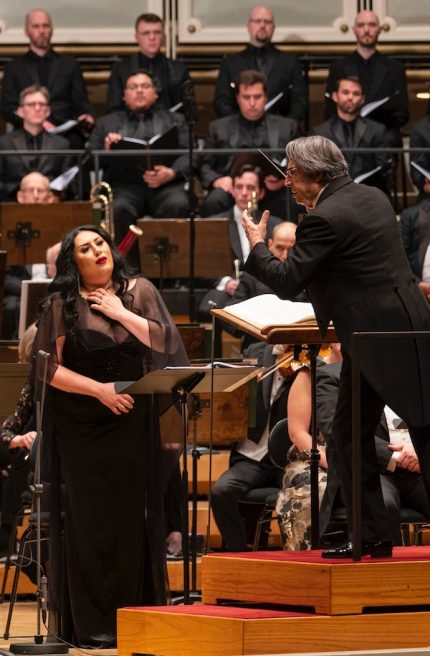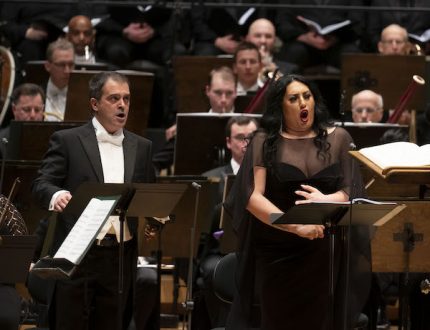Tenor’s impressive debut highlights magnificent Mascagni from Muti, CSO

Snow blanketed much of downtown Chicago Thursday night. But at Orchestra Hall Riccardo Muti, the Chicago Symphony Orchestra and Chorus and a stellar cast of singers effectively transplanted the audience to the sun-bedecked town square of a small Calabrian village on Easter morning, with the evening’s performance of Cavalleria Rusticana.
When the 27-year-old Pietro Mascagni completed his first opera and submitted it to a major competition, he was a little-known conductor and traveling musician. Cavalleria Rusticana proved a smash success from its 1890 premiere, quickly achieving international acclaim and maintaining a place in the repertoire that has never wavered over the last 130 years.
Mascagni would write 14 more operas and one operetta over his long life. Sadly, none enjoyed anything close to the success of Cavalleria, though his Japan-set Iris likely influenced Puccini’s Madama Butterfly, and the gentle romance L’amico Fritz receives occasional revivals, mostly in Italy.
Cavalleria has enjoyed a storied place in Chicago musical history, as pointed out in the fascinating program notes by Phillip Huscher and CSO archivist Frank Villella. Theodore Thomas brought the opera to Chicago (and Rockford!) less than a year after its premiere, and Mascagni himself conducted a performance (with a touring orchestra) at the Auditorium in 1902. The CSO performed the opera multiple times with a jaw-dropping array of Golden Age Santuzzas, including Emma Calvé, Florence Easton, Rosa Raisa, Elisabeth Rethberg, Emma Eames, and Claudia Muzio.
The reasons for the popularity of Mascagni’s one-act Cavalleria Rusticana were made manifest in the roiling, richly upholstered performance Muti led Thursday night—chockablock melodic richness, masterful scoring, and a taut, dramatic concentration, telling the tale of a violent love quadrangle in a concise 79 minutes.
Muti opted to present Cavalleria minus its traditional double-bill partner, Leoncavallo’s Pagliacci, though it’s unlikely anyone felt shortchanged. No surtitle screen was deployed this time after the noisy machine at last year’s Aida created problems, but full librettos and translations were provided. Yet the simple scenario and primal emotions of the characters are so immediate even non-aficionados can follow without a text.
The peasant Turiddu has jettisoned his former lover Santuzza for Lola, the wife of the carter Alfio. After a violent confrontation where Turiddu violently rejects the pleading Santuzza one final time, she swears vengeance and tells Alfio of the affair. Alfio challenges Turiddu who responds in the traditional way by embracing and biting Alfio’s ear. Alfio grimly replies “We understand each other” and awaits Turiddu offstage. A contrite Turiddu bids farewell to his mother Mama Lucia; soon a girl’s offstage cry that Turiddu has been murdered confirms his fate.
As shown over his decade-long Chicago tenure, Muti is never more convincingly in his element than when he is directing concert performances of Italian opera. So it proved again Thursday night with the CSO music director leading a sweeping, dramatic yet acutely detailed performance that had one marveling at surprising nuances of Mascagni’s orchestration, scoring subtleties often lost in the eye-grabbing visuals of the opera house.
At times, Muti’s grandly cinematic style and volatile climaxes threatened to swamp his singers but undeniably added to the sonic impact and exhilaration of this compelling performance.
A lapse in the opening harp solo aside, the orchestra members outdid themselves across every section with characterful solos amid gleaming climaxes and resplendent renditions of the Preludio and Intermezzo (the latter with organ as intended).

As with her memorable Amneris in the CSO’s Aida last year, mezzo-soprano Anita Rachvelishvili was in character as the discarded Santuzza from her stage entrance. Unsmiling and seemingly already plotting her revenge if Turiddu rejects her final plea, this was not a woman to mess with.
In a role that has been sung by sopranos and mezzos alike, the Georgian singer handled the high notes with power and aplomb, thrillingly ringing out over the chorus in the Easter Hymn. Apart from some persistently cloudy diction, Rachvelishvili was superb, her earthy tone bringing impassioned melancholy to “Vol la sapete” and charting Santuzza’s mercurial swings in the duet between jealous fury and begging Turiddu not to return to Lola.
Piero Pretti made a most impressive Chicago debut as Turiddu. The Sardinian tenor’s flexible middleweight instrument proved ideal for the role of the hapless, impetuous peasant and Pretti’s performance was nearly faultless.
Turiddu’s offstage opening Siciliana to Lola—here sung from the left back of the stage—displayed the singer’s vibrant tone, ardent style and agility. Pretti brought hearty swagger to Turiddu’s Brindisi and a well-judged mix of self-pity and desperation to Turiddu’s farewell to Mamma Lucia, his voice opening up for top notes with idiomatic squillo and ping. Pretti’s tempestuous scene with Rachvelishvili’s Santuzza was riveting in its theatrical intensity.
Luca Salsi—a memorable Macbeth in the CSO’s 2013 concert performances of Verdi’s opera—was a worthy foil as Turiddu’s alpha-male rival Alfio. If his cuckolded teamster lacked some danger in the early going, the Italian baritone brought throaty assertiveness to his entrance aria and chilling menace to his climactic confrontation with Turiddu.
Ronnita Miller provided dark, maternal tone as Lucia, Turiddu’s mother, some wobbliness apart. In a bit of luxury casting Sasha Cooke completed the all-mezzo trio as Lola, though this talented singer could have conveyed more of the character’s flirtatious sensuality. Italian diction coach Alessandra Visconti provided the strident, aptly jarring climactic cry of “Hanno Ammazzato compare Turiddu!” (“Turiddu has been murdered!”).
The performance was sealed by the magnificent singing of the underutilized Chicago Symphony Chorus. Prepared by Duain Wolfe, the women imbued the pastoral opening chorus with verdant freshness and the full ensemble brought robust panache to Alfio’s song and sumptuous vocalism to the Easter Hymn. Even the ominous confused murmuring that precedes Turiddu’s death was ideally realized.
Cavalleria Rusticana will be repeated 8 p.m. Friday and Saturday. cso.org; 312-294-3000.
Posted in Performances





Posted Feb 09, 2020 at 3:01 pm by John
I totally agree with you. It was incandescent and very powerful.